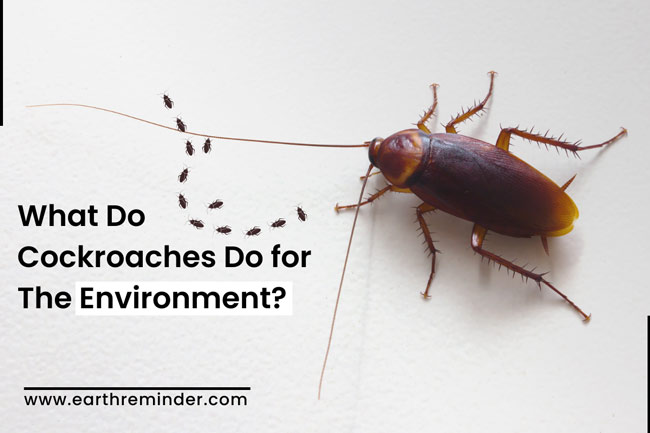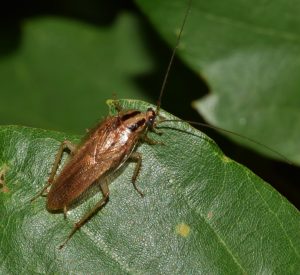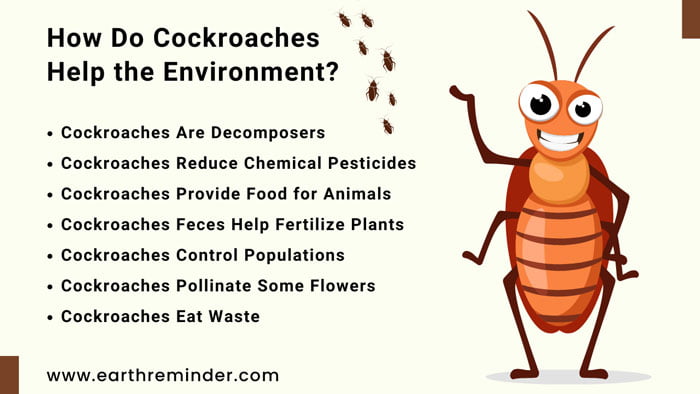Cockroaches serve the purpose of decomposing dead and decaying organic matter in the environment, contributing to the recycling of nutrients and maintaining ecological balance. Additionally, they aid in the process of breaking down plant material and trapping atmospheric nitrogen, providing essential nutrients for plant growth.
Cockroaches play a crucial role in the environment by serving as decomposers, helping to break down dead plant matter and releasing nutrients back into the soil. Through their feeding habits, they contribute to the recycling of organic material and the regeneration of nutrients for plant growth.
Despite their negative reputation, cockroaches serve an important ecological function by aiding in the decomposition process and promoting ecosystem health. Understanding the significance of these often misunderstood creatures can provide valuable insight into the intricate balance of the natural world.
Cockroaches As Decomposers
Cockroaches serve a purpose as decomposers, helping to clean up decaying organic matter and releasing nutrients into the soil for plants to use. Despite their negative reputation, they play a valuable role in the ecosystem by contributing to the environment’s recycling process.
Role In Breaking Down Organic Matter
Cockroaches play a vital role in breaking down organic matter. Their feeding habits involve consuming decaying plant material, leaf litter, and wood, aiding in the decomposition process.
Contribution To Soil Health
Cockroaches contribute to soil health by releasing essential nutrients. As they consume organic matter, they trap atmospheric nitrogen in their bodies, which is later released into the soil through their feces. This process enriches the soil, providing plants with easily-absorbed nutrients.
These tiny scavengers may seem pesky, but their role as decomposers is crucial for maintaining environmental balance and supporting ecosystem health.
Cockroaches In Food Chains
Did you know that cockroaches play a crucial role in the food chain? Let’s explore how these seemingly pesky creatures contribute to the ecosystem.
Prey For Other Animals
Cockroaches serve as prey for various animals, including small mammals, birds, and reptiles. Their presence as a food source is essential for maintaining the balance in the food chain.
Impact On The Ecosystem If Extinct
If cockroaches were to go extinct, it could lead to a significant disruption in the ecosystem. Small mammals, birds, and reptiles rely on cockroaches as a food source, and any disturbance in this link could have far-reaching consequences throughout the food chain.
Cockroaches In Waste Management
When it comes to waste management, cockroaches play a vital role in consuming decaying waste and cleaning up environments. These resilient insects are often associated with filth and disease, but they actually serve a purpose in maintaining ecological balance. Let’s explore the two main purposes that cockroaches serve in waste management:
Consumption Of Decaying Waste
Cockroaches are nature’s waste managers, as they have an exceptional ability to consume decaying organic matter. They are omnivorous creatures that feed on a wide range of food sources, including leftover food, dead plants, animal matter, and even paper and cloth. This consumption of decaying waste helps prevent the accumulation of rotting materials, reducing the risk of disease and foul odors.
What sets cockroaches apart from other insects is their incredible adaptability to survive on very little food and water. They can go for long periods without feeding, making them efficient cleaners in environments where food is scarce.
Cleaning Up Environments
Aside from their role in waste disposal, cockroaches contribute to cleaning up environments by ensuring the decomposition of organic matter. As they feed on decaying waste, they break it down into smaller particles, aiding in the natural process of decomposition. This process releases essential nutrients back into the environment, such as nitrogen, which is vital for plant growth.
Moreover, cockroaches also help improve soil quality. Their feces contain concentrated nutrients, including nitrogen, which enriches the soil when they decompose. This nutrient-rich soil becomes fertile ground for plants to grow and thrive.
In conclusion, cockroaches play a significant role in waste management by consuming decaying waste and cleaning up environments. They prevent the buildup of rotting materials, reducing the risk of disease, and aid in the natural decomposition process. Additionally, their feces contribute valuable nutrients to the soil, promoting healthy plant growth. Despite their reputation as pests, cockroaches are valuable contributors to maintaining ecological balance.
Credit: www.abc.net.au
Cockroaches In Scientific Research
Did you know that cockroaches play a vital role in scientific research, particularly in the pharmaceutical industry? Cockroaches in scientific research offer various insights and potential benefits for medicine.
Use In Pharmaceutical Industry
Cockroaches are used in research within the pharmaceutical industry due to their biological and genetic similarities to humans.
- Cockroaches help in the development of new drugs and understanding disease mechanisms.
- Their ability to withstand harsh conditions makes them valuable in testing drug efficacy.
- Furthermore, they are utilized to study antibiotic resistance and immune system responses.
Potential Benefits For Medicine
Their role in scientific research presents potential benefits for advancing medicine and healthcare.
- Studying cockroaches aids in discovering new treatments for various ailments.
- Their unique biological features provide insights into potential cures for illnesses.
- Cockroaches contribute to the development of innovative medical technologies.
Cockroaches As A Food Source
In many parts of the world, including Asia, Africa, and South America, cockroaches have long been used as a source of food. While many may find the idea unsettling, these resilient insects serve as a vital food source for both humans and non-human animals.
Use As Food For Humans
Believe it or not, cockroaches have been utilized as a source of food for humans. In some cultures, particularly in parts of Asia, roasted cockroaches are considered a delicacy. Additionally, they are often ground into a fine powder to be used as a high-protein additive in various foods. The high protein content in cockroaches makes them an attractive source of nutrition for human consumption, especially in areas where protein sources are limited.
Feeding Non-human Animals
In addition to being consumed by humans, cockroaches are also commonly used as feed for non-human animals. Many reptiles, birds, and small mammals, such as lizards and rodents, depend on cockroaches as a significant part of their diets. Due to the high protein and nutrient content found in cockroaches, they serve as an essential component of the diet for these animals, aiding in their growth and overall health.

Credit: www.earthreminder.com
Cockroach Farming
Considering the essential role of cockroaches in various ecosystems, cockroach farming has gained prominence for sustainable practices.
Process Of Rearing For Various Purposes
- Farming Practices: Cockroaches are reared to serve as food for humans and animals.
- Harvesting Stage: Cockroaches are collected at the optimal maturity level for consumption or processing.
- Processing Methods: Post-harvest, cockroaches undergo specific treatments such as boiling and drying based on their destined end use.
Sustainability And Economic Factors
- Environmental Contribution: Cockroach farming contributes to sustainable waste management by utilizing organic matter.
- Resource Efficiency: Cockroaches efficiently convert low-value waste into high-value protein sources.
- Market Opportunities: With a growing demand for alternative protein sources, cockroach farming offers a potential economic avenue.

Credit: www.resteasypestcontrol.com
Frequently Asked Questions
What Would Happen If Cockroaches Went Extinct?
If cockroaches went extinct, it would disrupt the food chain and have a widespread effect on the environment. Small mammals, birds, and reptiles that feed on cockroaches would be affected, causing a ripple effect on other animals and plants that rely on them for food.
Are There Any Benefits To Roaches?
Cockroaches serve a purpose in the environment by eating decaying organic matter, releasing nitrogen into the soil to benefit plants. They can also be raised as a food source for humans and animals, as well as used in the pharmaceutical industry.
Why Do We Have Roaches When We Are Clean?
Roaches can still infest clean homes if there are accessible food sources like crumbs or pet food, attracting them.
Conclusion
Cockroaches, often regarded as pests, actually play crucial roles in the ecosystem. Their ability to decompose decaying organic matter contributes to nutrient cycling and supports plant growth. Additionally, they serve as a food source for various animals, forming a part of the food chain.
Understanding their purposes helps us appreciate their role in maintaining ecological balance.
Related posts:

I’m MD Tanvir, and I bring years of expertise gained from working closely with pest control companies to the forefront. My journey in the industry has inspired me to launch Bug Battler, a platform aimed at equipping people with the know-how to combat pests autonomously. Through Bug Battler, I aim to empower individuals with practical insights to tackle pest infestations effectively.

